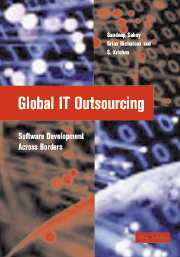Book contents
- Frontmatter
- Contents
- List of figures
- List of tables
- List of boxes
- Foreword
- Acknowledgements
- List of abbreviations
- 1 Introducing the phenomenon of global software work
- 2 Globalization and global software work
- 3 GlobTel's GSA programme in India
- 4 The GlobTel–Witech relationship: a ‘standardization’ perspective
- 5 Global software work: an identity perspective
- 6 The GlobTel–MCI relationship: the dialectics of space and place
- 7 Managing the knowledge transfer process: the case of Sierra and its Indian subsidiary
- 8 The case of Gowing and Eron GSA: power and control
- 9 Cross-cultural communication challenges: GSAs between Japanese and Indian firms
- 10 Reflections and synthesis on theoretical insights
- 11 Managerial implications
- Index
- References
11 - Managerial implications
Published online by Cambridge University Press: 14 January 2010
- Frontmatter
- Contents
- List of figures
- List of tables
- List of boxes
- Foreword
- Acknowledgements
- List of abbreviations
- 1 Introducing the phenomenon of global software work
- 2 Globalization and global software work
- 3 GlobTel's GSA programme in India
- 4 The GlobTel–Witech relationship: a ‘standardization’ perspective
- 5 Global software work: an identity perspective
- 6 The GlobTel–MCI relationship: the dialectics of space and place
- 7 Managing the knowledge transfer process: the case of Sierra and its Indian subsidiary
- 8 The case of Gowing and Eron GSA: power and control
- 9 Cross-cultural communication challenges: GSAs between Japanese and Indian firms
- 10 Reflections and synthesis on theoretical insights
- 11 Managerial implications
- Index
- References
Summary
Introduction
This chapter is concerned with developing implications to aid managers currently engaged in establishing, managing and strengthening GSA relationships. Our aim is to develop implications that are grounded in rich empirical data that has been subjected to rigorous theoretically informed analysis of ‘how the GSA process evolves over time’. This analysis develops relevant management implications around the six analytical themes discussed so far: standardization, identity, space and place, knowledge transfer, power and control and communication. The theoretical and empirical basis of the analysis helps us to transcend providing mere prescriptions and ‘how-to-do-it’ guides for GSA management and instead, develop a set of questions around key tensions that managers can analyse in the process of managing GSAs.
The GSA literature has a number of examples of prescriptions for management (see for instance Apte 1990; Apte and Mason 1995; Rajkumar and Mani 2001; Karolak 1998; Carmel 1999). For example, the rule to ‘outsource only structured tasks’ may work in certain situations but this is not always the case. Such rules, while useful in sensitizing managers to issues of importance for managing GSAs, are limited in the face of the complexity of the unfolding process over time, which makes it difficult to apply ‘best practices’ or ‘universal methodologies’. Prescriptive rule-based approaches tend to downplay the local and contingent situation in favour of broad generalizations and ignore the possibility that what worked well in one relationship may cause problems in another.
- Type
- Chapter
- Information
- Global IT OutsourcingSoftware Development across Borders, pp. 236 - 259Publisher: Cambridge University PressPrint publication year: 2003

